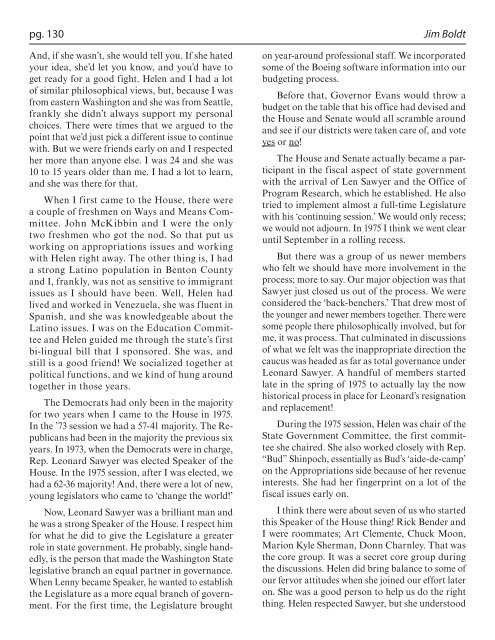Helen Sommers: An Oral History
Helen Sommers: An Oral History
Helen Sommers: An Oral History
You also want an ePaper? Increase the reach of your titles
YUMPU automatically turns print PDFs into web optimized ePapers that Google loves.
pg. 130 Jim Boldt<br />
<strong>An</strong>d, if she wasn’t, she would tell you. If she hated<br />
your idea, she’d let you know, and you’d have to<br />
get ready for a good fight. <strong>Helen</strong> and I had a lot<br />
of similar philosophical views, but, because I was<br />
from eastern Washington and she was from Seattle,<br />
frankly she didn’t always support my personal<br />
choices. There were times that we argued to the<br />
point that we’d just pick a different issue to continue<br />
with. But we were friends early on and I respected<br />
her more than anyone else. I was 24 and she was<br />
10 to 15 years older than me. I had a lot to learn,<br />
and she was there for that.<br />
When I first came to the House, there were<br />
a couple of freshmen on Ways and Means Committee.<br />
John McKibbin and I were the only<br />
two freshmen who got the nod. So that put us<br />
working on appropriations issues and working<br />
with <strong>Helen</strong> right away. The other thing is, I had<br />
a strong Latino population in Benton County<br />
and I, frankly, was not as sensitive to immigrant<br />
issues as I should have been. Well, <strong>Helen</strong> had<br />
lived and worked in Venezuela, she was fluent in<br />
Spanish, and she was knowledgeable about the<br />
Latino issues. I was on the Education Committee<br />
and <strong>Helen</strong> guided me through the state’s first<br />
bi-lingual bill that I sponsored. She was, and<br />
still is a good friend! We socialized together at<br />
political functions, and we kind of hung around<br />
together in those years.<br />
The Democrats had only been in the majority<br />
for two years when I came to the House in 1975.<br />
In the ’73 session we had a 57-41 majority. The Republicans<br />
had been in the majority the previous six<br />
years. In 1973, when the Democrats were in charge,<br />
Rep. Leonard Sawyer was elected Speaker of the<br />
House. In the 1975 session, after I was elected, we<br />
had a 62-36 majority! <strong>An</strong>d, there were a lot of new,<br />
young legislators who came to ‘change the world!’<br />
Now, Leonard Sawyer was a brilliant man and<br />
he was a strong Speaker of the House. I respect him<br />
for what he did to give the Legislature a greater<br />
role in state government. He probably, single handedly,<br />
is the person that made the Washington State<br />
legislative branch an equal partner in governance.<br />
When Lenny became Speaker, he wanted to establish<br />
the Legislature as a more equal branch of government.<br />
For the first time, the Legislature brought<br />
on year-around professional staff. We incorporated<br />
some of the Boeing software information into our<br />
budgeting process.<br />
Before that, Governor Evans would throw a<br />
budget on the table that his office had devised and<br />
the House and Senate would all scramble around<br />
and see if our districts were taken care of, and vote<br />
yes or no!<br />
The House and Senate actually became a participant<br />
in the fiscal aspect of state government<br />
with the arrival of Len Sawyer and the Office of<br />
Program Research, which he established. He also<br />
tried to implement almost a full-time Legislature<br />
with his ‘continuing session.’ We would only recess;<br />
we would not adjourn. In 1975 I think we went clear<br />
until September in a rolling recess.<br />
But there was a group of us newer members<br />
who felt we should have more involvement in the<br />
process; more to say. Our major objection was that<br />
Sawyer just closed us out of the process. We were<br />
considered the ‘back-benchers.’ That drew most of<br />
the younger and newer members together. There were<br />
some people there philosophically involved, but for<br />
me, it was process. That culminated in discussions<br />
of what we felt was the inappropriate direction the<br />
caucus was headed as far as total governance under<br />
Leonard Sawyer. A handful of members started<br />
late in the spring of 1975 to actually lay the now<br />
historical process in place for Leonard’s resignation<br />
and replacement!<br />
During the 1975 session, <strong>Helen</strong> was chair of the<br />
State Government Committee, the first committee<br />
she chaired. She also worked closely with Rep.<br />
“Bud” Shinpoch, essentially as Bud’s ‘aide-de-camp’<br />
on the Appropriations side because of her revenue<br />
interests. She had her fingerprint on a lot of the<br />
fiscal issues early on.<br />
I think there were about seven of us who started<br />
this Speaker of the House thing! Rick Bender and<br />
I were roommates; Art Clemente, Chuck Moon,<br />
Marion Kyle Sherman, Donn Charnley. That was<br />
the core group. It was a secret core group during<br />
the discussions. <strong>Helen</strong> did bring balance to some of<br />
our fervor attitudes when she joined our effort later<br />
on. She was a good person to help us do the right<br />
thing. <strong>Helen</strong> respected Sawyer, but she understood
















